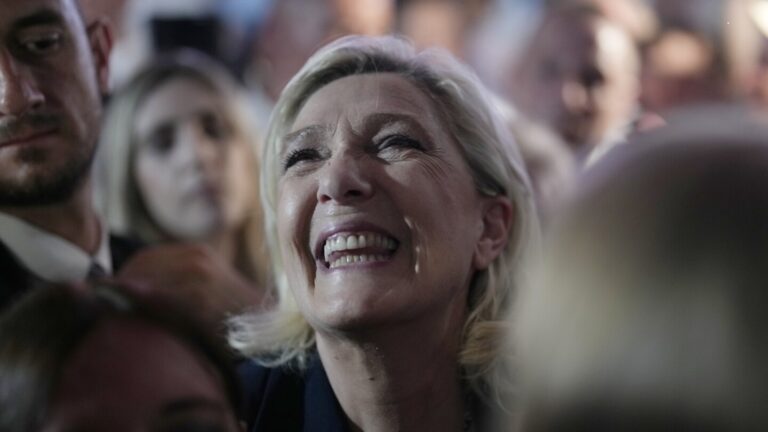PARIS (AP) — French voters face a decisive choice on July 7 in the runoff of snap parliamentary elections that could see the country’s first far-right government since the World War II Nazi occupation — or no majority emerging at all.
Official results suggest Marine Le Pen’s anti-immigration, nationalist party National Rally stands a good chance of winning a majority in the lower house of parliament for the first time, but the outcome remains uncertain amid the complex voting system and political tactics.
What happened?
In Sunday’s first round, the National Rally and its allies arrived ahead with around one-third of the votes. The New Popular Front coalition that includes center-left, greens and hard-left forces came in second position, ahead of President Emmanuel Macron’s centrist alliance.
Dozens of candidates who won at least 50% of Sunday’s vote were elected outright. All the other races head to a second round June 7 involving two or three top candidates.
Polling projections suggest the National Rally will have the most seats in the next National Assembly, but it is unclear whether it will get an absolute majority of 289 of the 577 seats.
The French voting system is not proportionate to nationwide support for a party. Legislators are elected by district.
What’s next?
The National Rally’s rivals are scrambling to keep it from getting an absolute majority.
The left-wing coalition said it would withdraw its candidates in districts where they finished in third position in order to support other candidates opposed to the far right. Macron’s centrist alliance also said some of its candidates would step down before the runoff to try to block the National Rally.
That tactic worked in the past, when Le Pen’s party and its predecessor National Front were considered a political pariah by many. But now Le Pen’s party has wide and deep support across the country.
Why is the far right rising?
While France has one of the world’s biggest economies and is an important diplomatic and military power, many French voters are struggling with inflation and low incomes and a sense that they are being left behind by globalization.
Le Pen’s party, which blames immigration for many of France’s problems, has tapped into that voter frustration and built a nationwide support network, notably in small towns and farming communities that see Macron and the Paris political class as out of touch.
What’s cohabitation?
If the National Rally or another political force than his centrist alliance gets a majority, Macron will be forced to appoint a prime minister belonging to that new majority.
In such a situation — called “cohabitation” in France — the government would implement policies that diverge from the president’s plan.
France’s modern Republic has experienced three cohabitations, the last one under conservative President Jacques Chirac, with Socialist Prime Minister Lionel Jospin, from 1997 to 2002.
The prime minister is accountable to the parliament, leads the government and introduces bills.
The president is weakened at home during cohabitation, but still holds some powers over foreign policy, European affairs and defense because he is in charge of negotiating and ratifying international treaties. The president is also the commander-in-chief of the country’s armed forces, and is the one holding the nuclear codes.
Why does it matter?
The National Assembly, the lower house, is the more powerful of France’s two houses of parliament. It has the final say in the law-making process over the Senate, dominated by conservatives.
Macron has a presidential mandate until 2027, and said he would not step down before the end of his term. But a weakened French president could complicate many issues on the world stage.
During previous cohabitations, defense and foreign policies were considered the informal “reserved field” of the president, who was usually able to find compromises with the prime minister to allow France to speak with one voice abroad.
Yet today, both the far-right and the leftist coalition’s views in these areas differ radically from Macron’s approach and would likely be a subject of tension during a potential cohabitation.
Far-right leader Jordan Bardella, who could becomes prime minister if his party wins the majority of the seats, said he intends “to be a cohabitation prime minister who is respectful of the Constitution and of the President of the Republic’s role but uncompromising about the policies we will implement.”
Bardella said that as a prime minister, he would oppose sending French troops to Ukraine — a possibility Macron has not ruled out. Bardella also said he would refuse French deliveries of long-range missiles and other weaponry capable of striking targets within Russia itself.
What happens if there’s no majority?
The president can name a prime minister from the parliamentary group with the most seats at the National Assembly even if they don’t have an absolute majority — this was the case of Macron’s own centrist alliance since 2022.
Yet the National Rally already said it would reject such an option, because it would mean a far-right government could soon be overthrown through a no-confidence vote if other political parties join together.
The president could try to build a broad coalition from the left to the right, an option that sounds unlikely, given the political divergences.
Another option would be to appoint “a government of experts” unaffiliated with political parties but which would still need to be accepted by a majority at the National Assembly. Such a government would likely deal mostly with day-to-day affairs rather than implementing major reforms.
If political talks take too long amid summer holidays and the July 26-Aug. 11 Olympics in Paris, Macron’s centrist government could keep a transitional government pending further decisions.


